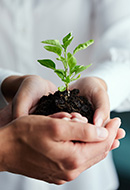Added value: social dividend
We work to provide shared added sustainable value for all of our Stakeholders
Iberdrola Group sees the social dividend as a way of providing direct, indirect or induced added value to Stakeholders through our activities, while also helping to fulfil the Sustainable Development Goals (SDGs).
Behind Social Dividend can be found:
-
Iberdrola's commitment to sustainable development.
-
The contribution to the progress of the societies into which Iberdrola becomes integrated and in which it wants to be a motor for economic, social and environmental change.
-
Share the success of Iberdrola's business project with all Stakeholders.
-
The direct, indirect and induced impacts of Iberdrola activities for all Stakeholders.
-
Iberdrola's response to the most relevant sector issues, the needs of its Stakeholders and the most important challenges faced by the communities in the countries in which it operates.
-
Iberdrola's boost to the business communities in which it participates and leads from an economic point of view, from the perspective of business ethics, promoting a sense of belonging and justice, encouraging innovation and environmental care through generating quality employment that guarantees equal opportunities and non-discrimination in managing people, as well as leadership in the fight against climate change.
The following chart is a summary overview of the most prominent aspects of Iberdrola's creation of value in each of its six Stakeholders:
Main aspects of sustainable value contribution for our Stakeholders
Iberdrola people
Quality and future-oriented employment in an equal opportunities work environment:
- Direct employment: over 42,000 people.
- New recruitments: over 6,000 new professionals
- Training: 73.8 hours per person per year.
- International workforce: employees of 95 nationalities.
- Safe working environment.
- Flexibility and reconciliation measures to reconcile work, private and family life.
- Our employees' field of work: green jobs.
- Strengthening Young Talent programmes: Master's Scholarships and International Graduate Programme.
Shareholders and the financial community
Stability and return on invest:
- Business model: resilient, responsible, sustainable and long-term.
- Governance and sustainability system: based on ethics, good governance and transparency.
- Financial strength. Net profit: €5.612bn (+17%), EBITDA: €16.848 bn (+17%), Cash flow: €11.836bn.
- Dividend growth: 0.15%. Total shareholder return: +15%.
- Leadership in green and sustainable finance: €9.643 billion in new green operations.
- Shareholder engagement measures.
Customers
Secure and competitive energy supply:
- Quality of supply and incidente resolution.
- Smart grids: 81.4% of total networks.
- Smart and innovative solutions: residential and industrial areas.
- Customer experience: accessible solutions for customers, as well as digital customer.
- Vulnerable customers: protection procedures.
Supply chain
Collaboration, traction and opportunities:
- Purchases worldwide: over €18bn employing 500.000 people*.
- Sustainable: 96% of the amount awarded, allocated to suppliers assessed according to sustainable criteria.
- Promoting of human rights protection.
- Partnerships and agreements for joint emission reductions and to accelerate and facilitate the development of green products.
Community
Ongoing institutional collaboration and contribution to community development:
- Record investments: 11.946 billion (+5%), plus 5 billion in the corporate operations of Avangrid and ENW.
- 2024-2026 Investment: €41 bn.
- Tax contribution: €10.3bn.
- Contribution to the community: 56.7M€ contribution to society: foundations and others.
- Foundations' activity: 10m annual beneficiaries in 2030.
- Innovation: More than 400M€ of investment in innovation.
- "Electricity for all programme": 13.8 million beneficiaries (cumulative).
- Volunteering: 22,800 volunteers with their families.
- Sport: support for 800,000 sportsmen and women.
Environment
Combating climate change and protecting biodiversity:
- CO2 emissions: emissions of 38g CO2/kWh in Europe, 5 times lower than industry average.
- Biodiversity: nature positive.
- Circular economy: 100% recycling of blades and panels by 2030, reaching 98.4% by 2024.
- Global leadership in clean energy: 84% emission-free installed capacity.
- Conservation, restoration and tree planting programme: 5M trees.
- Commitment to reduce water consumption.
*PwC study “Economic, tax, social and environmental impact of the Iberdrola Group worldwide” (prepared with 2023 data) Download examples of how the group creates value for its Stakeholders [PDF]
Download examples of how the group creates value for its Stakeholders [PDF]
We also highlight the best practices carried out in the countries in which Iberdrola has a presence: Spain, the United Kingdom, the United States, Brazil, and Mexico.
Good practices by country:
Spain
New Customer App Functionality - Chat “recovery”
Iberdrola Spain has launched an innovative tool that allows customers to self-manage and sign up for a plan that fits their needs. This tool offers a personalised way of addressing customers’ main queries, allowing greater autonomy in choosing when they wish to interact with the bot.
United Kingdom
National Planning Improvement Hub in Scotland
The Scottish Government has established a hub to provide expertise to promote green energy development and opportunities in Scotland. Against this backdrop, ScottishPower proposed potential solutions to the challenges associated with permitting, a measure that was welcomed and appreciated by the Scottish Government. The hub will initially focus on accelerating the process of granting permits for hydrogen projects until March 2025. In the future, this team will focus on other types of development, including wind energy, thus benefiting other ScottishPower initiatives
United States
Indigenous communities
In the United States, state regulators are increasing requirements related to engagement and impacts, including those affecting indigenous peoples. An example of this is New York State’s policies and requirements, which are aligned with the UN principle of Free, Prior, and Informed Consent (FPIC), recognising the need for projects to consider the direct and indirect impacts on indigenous peoples
Brazil
Social Working Group
The experience of the Social Working Group of Neoenergia’s Sustainability and Renewable Energy Department involves more than 10 technical and corporate areas and aims to create a space for exchanging ideas and making decisions to continuously improve human rights due diligence.
The benefits of this group include preventing and reducing impacts, managing grievance mechanisms, engaging stakeholders and improving relations with communities. The working group focused on human rights involves 300 leaders, managers, analysts, technical teams (wind, solar and hydro) and corporate areas and has become a benchmark for the Civil Office of the Presidency of the Republic.
Mexico
Customer loyalty programme
This programme is designed to strengthen long-term relationships with customers and provide greater value by focusing completely on the customer experience and seeking to directly impact them.
The actions undertaken by the programme most notably include Smart Solar opening ceremonies, where the achievement of important sustainability goals is celebrated with customers. Visits to facilities are also organised, inviting customers to learn about Iberdrola’s power generation operations, which fosters engagement and relationships.
In addition, personalised events are held, such as Energy Day and the annual Iberdrola Awards, which recognise customer loyalty to the Company.
Community engagement: Creating sustainable value for all
Iberdrola maintains relationships with communities during all phases of a project and establishes dialogue channels through which the communities can communicate their expectations and needs.
Iberdrola continuously strengthen its involvement among the communities in which it operates through a Stakeholder Engagement process aligned with the principles set in the Stakeholders Engagement Policy and aimed at identifying potential human rights impacts and creating sustainable value for all. Stakeholders at project level may include potentially affected communities or individuals, as well as their formal or informal representatives, among others. Special attention is given to vulnerable groups including Indigenous peoples.
Stakeholders participation is key to guarantee projects' environmental, social, and economic performance during all its lifecycle (See Human Rights section). Therefore, meeting and engaging with them at an early stage allows Iberdrola to better understand their expectations and needs and include them at the centre of our decisions.
The Stakeholder Engagement process includes an identification of potentially affected Stakeholder, directly or indirectly, by the activity of the company and its projects - through environmental and social impact assessment. The Company has also developed its own Global Stakeholder Engagement Model, which is aimed at identifying the legitimate expectations of its Stakeholders.
Disclosure and dissemination of information is part of Iberdrola's projects' core engagement commitment to its Stakeholders. Therefore, Iberdrola has set up communication and engagement channels (i.e., community surveys, specific panels…) and other mechanisms at project level able to ensure that all Stakeholders, including those at in the surrounding of our facilities, are properly informed and are able to interact and communicate its expectations and concerns. Meaningful consultation is key to begin building the project’s community relations in a transparent and open-dialogue manner. Iberdrola considers Stakeholders’ opinions and expectations as a source of valuable information for continuous improvement. With the aim of collecting and processing the information gathered throughout the consultation process in a more efficient way, Iberdrola is currently developing a digital tool.
The company allows Stakeholders to reach out to the organization and communicate any concerns through different available channels and grievance mechanisms i.e., ethical mailboxes and other grievance mechanism at the project’s facilities. Each grievance is recorded, reviewed and assessed in order to identify the type of remedy process needed. Access to the Whistle Blower channel is also available. The channel follows guarantee the anonymity, confidentiality, and the prohibition of retaliation against the person who has made use of the channel.
The company continues to focus on developing the Stakeholder Engagement strategy, therefore it has set an ambitious Stakeholder Engagement target as part of its Group’s 2024-2026 Strategic Plan related to the implementation of the Stakeholder Engagement Model at facility level.

Corporate purpose and values
A model that prioritizes the people and the planet.

Stakeholder capitalism
A commitment to long-term, sustainable value creation.















